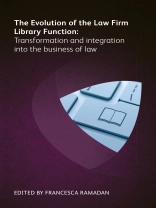The modern legal library is caught in a transformative stage. Often seen by firm management as unnecessary and outdated, legal libraries are facing a double-pronged challenge: it is now essential for librarians to demonstrate the continuing value of their profession whilst battling with shrinking budgets and the development of new, disruptive technologies that are transforming working practices and processes at a rapid rate.
表中的内容
Chapter 1: The modern library – running a business within a business By Monice Kaczorowski, vice president of library strategy and innovation for Feit Consulting Chapter 2: Collaboration and coordination – the integration of the library into the ‘business of law’ By Kara Buzga, paralegal manager at Mayer Brown LLP, and Tunisia Johnson, legal information administrator at Mayer Brown LLP Chapter 3: Absorbing library services into knowledge management By Patrick Di Domenico, chief knowledge offi cer at Ogletree Deakins Chapter 4: Leveraging research analytics to build insight and revenue By Scott D Bailey, global director of research services at Squire Patton Boggs LLP Chapter 5: How law fi rm professionals can make an impact on practice orientated legal education By Jocelyn K Sagherian, reference librarian at the Maloney Law Library of the Fordham University School of Law Chapter 6: Are you running a 24-hour law library? By Jim Haggerty, vice president of LAC Group Chapter 7: How to demonstrate value and withstand executive scrutiny – a consultant’s perspective By Michael Feit, president of Feit Consulting Chapter 8: How strong relationships and expertise aid business development with clients – a case study By Cynthia Brown, director of research services at Littler Mendelson PC, and Jill L Kilgore, research librarian at Littler Mendelson PC Chapter 9: The evolution of a law library from physical to mobile By CJ Anderson, head of information and research at Linklaters LLP, London Chapter 10: Makers in the library – the new age of hands-on artificial intelligence By Ed Walters, CEO of Fastcase, and Sean Tate, AI sandbox product manager at Fastcase
关于作者
CJ Anderson Head of information and research at Linklaters LLP, London Scott D Bailey Global director of research services at Squire Patton Boggs LLP Cynthia Brown Cynthia Brown is the director of research services at Littler Mendelson, the world’s largest employment and labor law practice representing management where she has bridged the worlds of the Library and Knowledge Management since 2007. Her previous experience includes working as in-house counsel for four years at a small risk management firm, as an account manager and training consultant at Lexis Nexis, and running a solo library in Salt Lake City at Jones Waldo Holbrook & Mc Donough. Kara Buzga Paralegal manager at Mayer Brown LLP Patrick Di Domenico Chief knowledge officer at Ogletree Deakins Jim Haggerty Vice president of LAC Group Tunisia Johnson Legal information administrator at Mayer Brown LLP Monice Kaczorowski Vice president of library strategy and innovation for Feit Consulting Jill L Kilgore Research librarian at Littler Mendelson PC Jocelyn K Sagherian Reference librarian at the Maloney Law Library of the Fordham University School of Law Sean Tate AI sandbox product manager at Fastcase Ed Walters Ed Walters is the CEO of Fastcase, a legal publishing company based in Washington, D.C. Fastcase is one of the world’s largest legal publishers, serving more than 800, 000 subscribers from around the world. He is an adjunct professor at the Georgetown University Law Center, where he teaches The Law of Robots, a class about the frontiers of law and technology. Before founding Fastcase, Ed worked at Covington & Burling, in Washington D.C. and Brussels, where he advised Microsoft, Merck, Smith Kline, the Business Software Alliance, the National Football League, and the National Hockey League. His practice focused on corporate advisory work for software companies and sports leagues, and intellectual property litigation.












